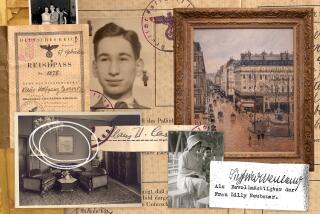France considers reparations for Holocaust survivors in U.S.
WASHINGTON — Seventy-two years after Nazis began deporting French Jews to concentration camps, the French government is negotiating to pay reparations for the first time to several hundred Holocaust survivors now living in the U.S. who survived unspeakable conditions while being transported in government-owned rail cars and in the death camps at the end of the line.
Stuart Eizenstat, a Washington lawyer who advises the State Department on Holocaust issues, said in an interview Friday that the French government entered into formal talks Feb. 6 and appeared to be intent on wrapping up negotiations by the end of the year.
The French, who previously resisted paying reparations to U.S.-based survivors of the rail deportation, appear to have been influenced by legislation pending in Congress to make it easier for victims to sue in U.S. courts, and also by efforts in California, Maryland and Florida to block Keolis, a subsidiary of the French national railroad SNCF, from winning contracts to build or operate high-speed rail systems.
The company operates commuter rail, bus and taxi systems around the country, including in Anaheim, Pomona and Van Nuys, according to company spokeswoman Leslie Aun. She refused to comment on the reparations negotiations.
The SNCF — the Societe Nationales des Chemins de fer Francais —– allegedly carried 76,000 Jews and other prisoners to Nazi concentration camps in stifling cattle cars. Survivors said the railroad workers often refused to provide any water for the days-long trips because they didn’t want to slow down the trains. Of the 76,000, only 2,000 survived the war.
Holocaust survivor Rosette Goldstein, of Boca Raton, Fla., still chokes with emotion when recalling her father’s deportation. She escaped Nazis by hiding at the farm of a non-Jewish French family, but her father, uncle, aunt, and two cousins were killed.
She blamed the French railroad workers who crammed her father and other Jews into airless, packed cars.
“They are the ones who locked the doors,” she said. “And they knew where they were going.”
She said she wants to live to hear the SNCF admit “what their role was in the Holocaust. We have so little time left. I’m 75, but most of the people on those railroads either didn’t come back or are in their 90s.”
She remains skeptical about whether the French will pay reparations. “When I see, it I’ll believe it,’’ she said.
The French government is paying reparations averaging about $45,000 per person a year to rail deportees who are citizens of France and several other European countries, plus smaller amounts to widows and orphans of survivors. But they have yet to pay anything to U.S.-based victims because no formal agreement was reached between the two countries.
“They came to us and said they could mend the holes in the blanket of their past pension programs,” Eizenstat said of the French government. The negotiations were first reported in the Washington Post.
Efforts to sue the SNCF in U.S. civil courts failed because the company is owned by a foreign government. The U.S. Supreme Court refused to hear an appeal from a group of survivors in 2011, according to Raphael Prober, a Washington lawyer representing survivors.
Those who would benefit in the U.S. from French reparations would include anyone who was deported on the French railroad to concentration camps outside the country and is now living in the U.S. Some survivors’ relatives may also qualify, Eizenstat said.
Lawyers who represent roughly 250 survivors of the French deportations who are living in the U.S. say they also hope that an additional 350 survivors living in other countries, including Israel, will be covered.
Not all of the survivors who may receive reparations are Jewish.
Chasten Bowen, 89, who lives in Anaheim, says that reparations would not matter to him now. “I’m just about ready to leave this world,” he said. “If there’s money available, there are others who need it worse than I do.”
Bowen lived in Compton before becoming a radio operator and gunner in the U.S. Army Air Forces. The Gestapo captured him after his B-17 bomber was shot down over France in 1943 and put him in front of a firing squad, then, for unknown reasons, spared him. They loaded him and scores of others into a boxcar headed for Buchenwald. There he was shaved, deloused and beaten. Guards told him that he would leave the camp only one way: through the smokestack of the crematory.
He was transferred to a prisoner-of-war camp that Gen. George S. Patton liberated in 1945.
Four years ago, Bowen testified in favor of a state measure that would have required rail companies interested in working on the California high-speed train project to admit whether they transported people to concentration camps during World War II. Then-Gov. Arnold Schwarzenegger vetoed the bill, which was drafted partly in response to the SNCF’s interest in bidding on California’s 800-mile bullet train from San Diego to San Francisco.
Times staff writer Martha Groves in Los Angeles contributed to this report.
More to Read
Start your day right
Sign up for Essential California for news, features and recommendations from the L.A. Times and beyond in your inbox six days a week.
You may occasionally receive promotional content from the Los Angeles Times.







